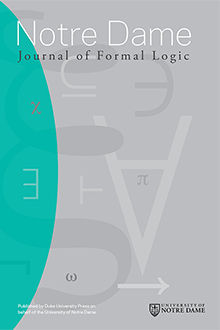Abstract
This article improves two existing theorems of interest to neologicist philosophers of mathematics. The first is a classification theorem due to Fine for equivalence relations between concepts definable in a well-behaved second-order logic. The improved theorem states that if an equivalence relation is defined without nonlogical vocabulary, then the bicardinal slice of any equivalence class—those equinumerous elements of the equivalence class with equinumerous complements—can have one of only three profiles. The improvements to Fine’s theorem allow for an analysis of the well-behaved models had by an abstraction principle, and this in turn leads to an improvement of Walsh and Ebels-Duggan’s relative categoricity theorem.
Citation
Sean C. Ebels-Duggan. "Abstraction Principles and the Classification of Second-Order Equivalence Relations." Notre Dame J. Formal Logic 60 (1) 77 - 117, 2019. https://doi.org/10.1215/00294527-2018-0023
Information





